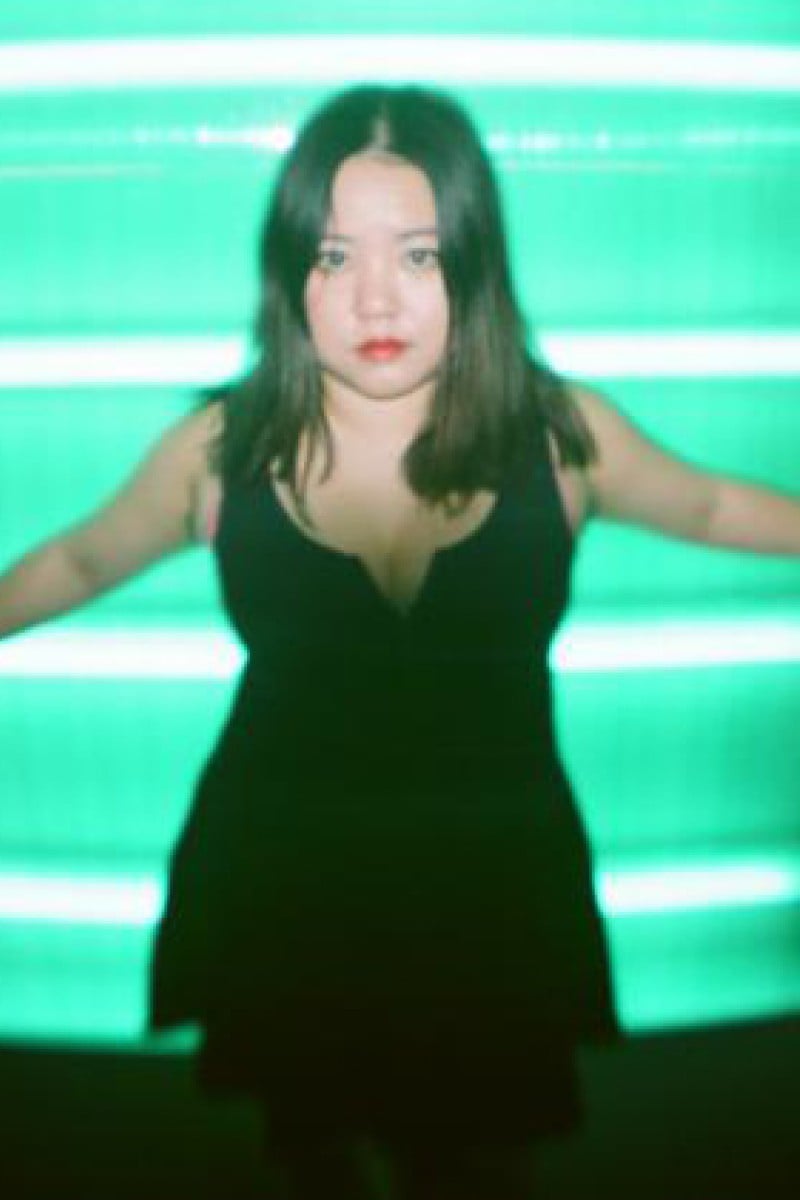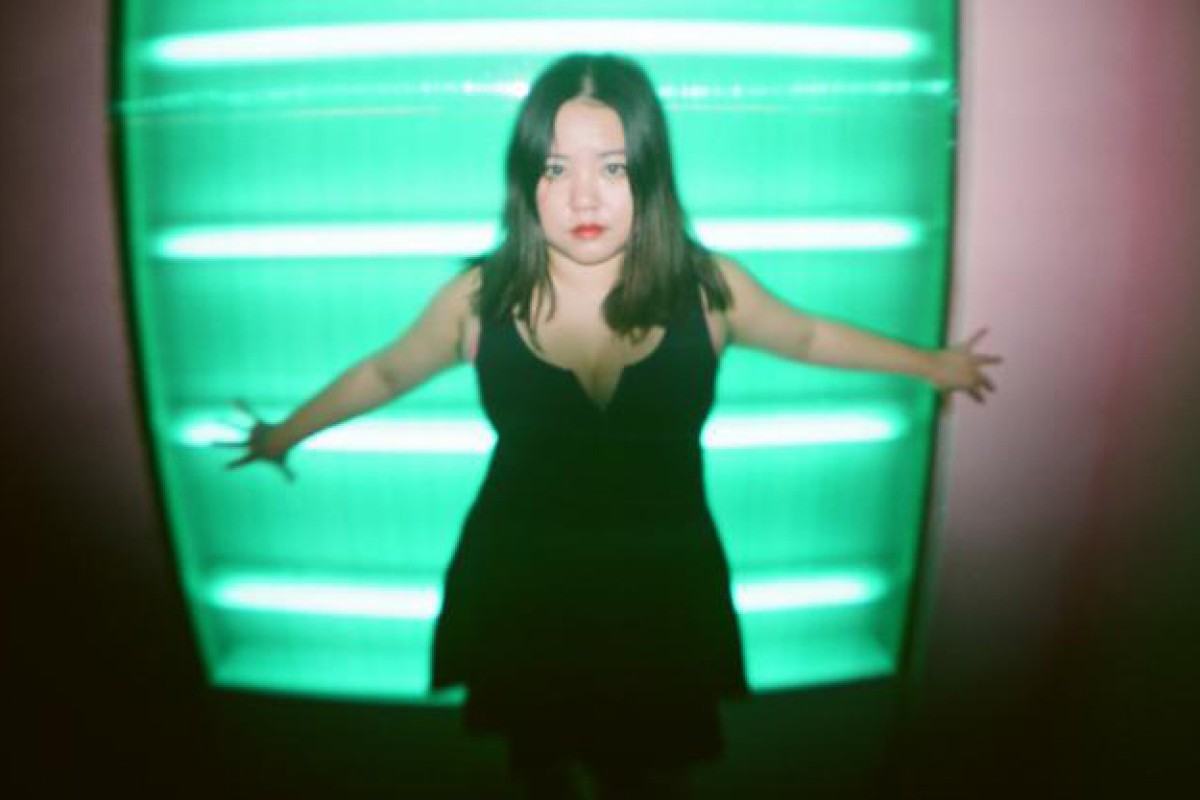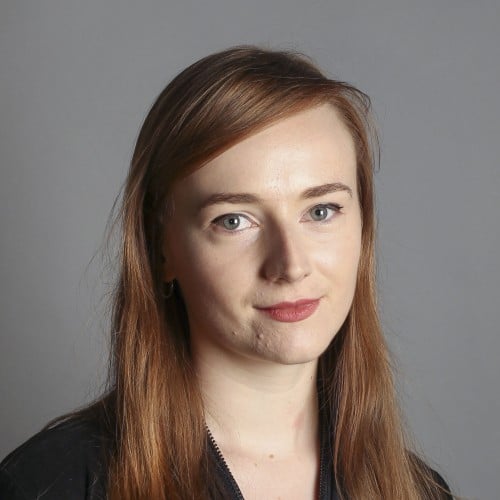
Taiwanese rapper Aristophanes on collaborating with Grimes, escaping her parents, and the depths within new album Humans Become Machines
Pan Wei-ju, aka Aristophanes, shares her thoughts on her Greek-inspired stage name, working with Grimes for a second time, and her Asian identity
 Pan Wei-ju, aka Aristophanes, under the neon lights at Bound, in Prince Edward
Pan Wei-ju, aka Aristophanes, under the neon lights at Bound, in Prince EdwardBathed in the glow of neon lights, Pan Wei-ju looks like a supernatural being. Onstage as Aristophanes, she is no different: her music sounds like it could have been beamed down from a spaceship. And her rise to fame has been nothing short of out of this world.
When you hear Aristophanes on record, she delivers her lyrics like secrets, in an intoxicating, sibilant rush of Putonghua alongside electronic beats. Visceral yet hushed, breathy yet bold, her flow is unique. But that hissed whisper that snakes into your ears through headphones mutates into a defiant screech onstage. She sees those contrasting deliveries less as two different personas, and more how she is around friends compared to in public.
The 26-year-old Taiwanese rapper was due to play a show in Central in February, but as she explained when Young Post caught up with her last month over coffee at Bound, a cafe in Prince Edward, it was scaled back to a DJ set after she came down with Bell’s Palsy – a condition that weakens the muscles in the face. She managed to use it to her advantage, though.
“Being able to stop and think about new things was good for me.”
That makes sense when you consider her last 18 months. She was rocketed into the spotlight when Canadian singer and electronic producer Claire Boucher, better known as Grimes, found her music on Soundcloud and asked her to collaborate on Scream, a track released on late-2015 album Art Angels. Since then, the pair have performed together all over the world, and Pan went to stay at Boucher’s place in Los Angeles, where the two united a second time to produce Pan’s track, Humans Become Machines.
Whether they’re swapping tracks online, or sitting together in the studio, the two discovered a chemistry that makes making music feel natural. “It was so much fun staying at her place, I can’t wait to hang out again – I really want to meet her dog!” adds Pan, an avowed animal-lover, who scrolls through cat and dog photos and videos every day.
“She was really sweet when she heard about my Bell’s Palsy. She and Hana [Pestle, who tours with Grimes] got together and shot a video of themselves singing for me and wishing me a quick recovery.”
Having recovered from her illness, Pan is looking forward to taking her album on the road, and has been working with German digital artist Tobias Gremmler to create a 60-minute 3D visual experience to accompany her music. It’s still a work-in-progress, but Pan can’t wait to see how it’ll turn out. “I may end up looking like a robot!” she jokes.
It’s easy to imagine how tracks from Humans Become Machines will mesh with such a futuristic stage show. Recording in New York last summer opened her mind to new ways of making music.
“Until then, I’d never really worked in studios. I can do a lot of creative things on my own in my bedroom, but being in that studio was like going to class.”
Playing her first New York gig, she met the singer Sandflower, who ended up lending her voice to the track Birth of a Prayer.
Pan had been sitting on the lyrics for three years, waiting for the right music, and found just that with legendary producer David Kahne. The lush song has an almost jazz-pop sound, but you’d be wrong if you took it for one of the album’s lighter tracks. “It’s about the relationship between humans and God, whatever kind of god that is,” she explains.
The song is about a person trying to communicate with a god hiding under the bed. After the god emerges, the two talk face-to-face before the god disappears. “It’s the idea that God didn’t create humans; humans created God, because we need something to believe in and pray to.”
She continues, “It’s called Birth of a Prayer, because a prayer is when we talk to God. I wanted the song to be a prayer to look at the relationship between humans and God.”
Not all Aristophanes songs have such deep meanings: Birth of a Prayer was typical of a time a few years back when Pan was very interested in philosophy. It was during that same period she adopted her Greek-inspired stage name.
Working with producers like Grimes or Arcade Fire’s Win Butler, neither of whom speak Chinese, has its challenges, but Pan is happy to translate. “Some people have wanted me to sing or rap in English ... I might sell more records if I [did], but I’m not going to. If I wrote some good English lyrics, I’d use them, but I haven’t so far. I can speak English, but my Mandarin is so much better, so my lyrics are better too.”
Despite being featured in some of the world’s most prominent music magazines, the former teacher says the attention can make her feel awkward. “I get really shy, and don’t know how to react when people tell me I’m good or they like my music. I didn’t have to deal with any of that when it was just me in my bedroom with a microphone.”
In many of her interviews, her profile focuses on her Asian identity and upbringing in Taiwan. But, ironically, her career gave her the escape from home she’d been looking for. “I’ve been longing for an escape from my family for years. They’re good people, but [we’re different]. I need to build my own life.” Pan’s parents know little about her career, and when the subject is brought up, she urges, “Nooo, don’t tell them!” in mock desperation.
“My mum hates music, it gives her a headache. I’ve talked to my dad about it a bit, because he’s a big jazz fan. And he knows Kahne as Paul McCartney’s producer, so he thinks that’s cool.”
She continues: “It can be hard for Asian parents to support their children if they want to be an artist. My parents don’t speak English, so they’d freak out if they found out I’m now travelling in the West and speaking a language they don’t understand. They’d feel insecure as they wouldn’t understand what I’m doing.”
Considering her career’s current trajectory, it might not be long until her parents come face-to-face with their daughter's career and jet-setting lifestyle. Now Pan is in a position to spend every day making music, the next 12 months will be packed with as much writing and performing as possible.
“When I was a teacher, I didn’t have much time for my art. I had to squeeze it into my free time,” she says, before adding, finally: “Now, I’m like a really greedy child in a candy shop. I have lots of time and lots of brilliant artists to work with. I can put my full heart into music.”
